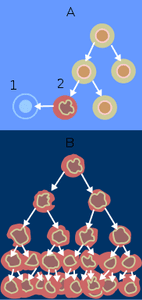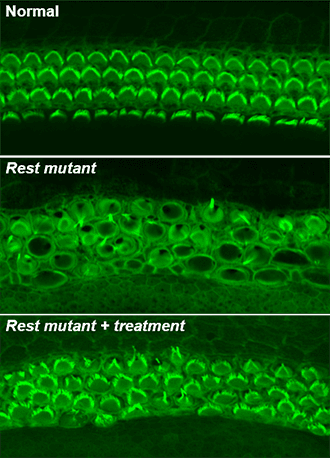
The results lay the foundation for researchers to plan a future phase 1 clinical trial to test the safety of the therapy in a small group of patients
Results from a recent preclinical study have shown that a new drug combination therapy being developed at Virginia Commonwealth University Massey Cancer Center effectively killed colon, liver, lung, kidney, breast and brain cancer cells while having little effect on noncancerous cells. The results lay the foundation for researchers to plan a future phase 1 clinical trial to test the safety of the therapy in a small group of patients.
“It is still too premature to estimate when a clinical trial will open to further test this drug combination therapy, but we are now in the planning phase and encouraged by the results of these laboratory experiments,” says Andrew Poklepovic, M.D., oncologist and member of the Developmental Therapeutics research program at VCU Massey Cancer Center and assistant professor in the Division of Hematology, Oncology and Palliative Care at VCU School of Medicine. “We are also encouraged by the fact that the drugs used in this therapy are either already approved by the FDA to treat certain cancers or are currently being investigated in other clinical trials.”
Featured in the journal Molecular Pharmacology, the study led by Paul Dent, Ph.D., demonstrated that the drugs sorafenib and regorafenib synergize with a class of drugs known as PI3K/AKT inhibitors to kill a variety of cancers. Sorafenib and regorafenib work by blocking the production of enzymes called kinases, which are vital to the growth and survival of cancer cells. Sorafenib is currently approved by the FDA to treat kidney and liver cancers, and regorafenib is currently approved for the treatment of colorectal cancer. However, sorafenib and regorafenib do not directly affect PI3K and AKT kinases, which are also very active in promoting cancer cell survival. The addition of a PI3K/AKT inhibitor to the combination of sorafenib and regorafenib dramatically increased cell death and was even effective against cells with certain mutations that make one or the other drug less effective.
“We know that there are certain cellular processes that are frequently dysregulated in cancers and important to cell proliferation and survival, but if you shut down one, then cells can often compensate by relying on another,” says Dent, Universal Corporation Distinguished Professor for Cancer Cell Signaling and member of the Developmental Therapeutics research program at VCU Massey Cancer Center as well as vice chair of the Department of Neurosurgery at VCU School of Medicine. “We are blocking several of these survival pathways, and the cancer cells are literally digesting themselves in an effort to stay alive.”
Go deeper with Bing News on:
Drug combination therapy
- Why the obesity drug market is about to get a lot more crowded
The U.S. is set to see a surge in obesity drug introductions over the next five years. Here’s a rundown of the potential entrants.
- Business Combination of Kinarus Therapeutics Holding AG (now renamed to Curatis Holding AG) and Curatis AG completed
The Business Combination of Kinarus Therapeutics Holding AG (now renamed to Curatis Holding AG) with Curatis AG and related transactions were completed on 25 April 2024 The first trading day of the ...
- Cost of developing new drugs may be far lower than industry claims, trial reveals
Its own bill for landmark trials of a four-drug combination treatment for drug-resistant tuberculosis came to €34m (£29m). Current estimates for research and development of new medicines range ...
- Multiple Myeloma News
has benefits for patients with multiple myeloma when used in combination with another drug. This discovery offers a new avenue of treatment options for the ... Sep. 12, 2023 — A ground-breaking ...
- Children and teenagers with an aggressive form of brain cancer set to benefit after NICE recommends new life-extending drug combination treatment
Children and teenagers with an aggressive form of brain cancer set to benefit after NICE recommends new life-extending drug combination treatment ...
Go deeper with Google Headlines on:
Drug combination therapy
[google_news title=”” keyword=”Drug combination therapy” num_posts=”5″ blurb_length=”0″ show_thumb=”left”]
Go deeper with Bing News on:
Combination therapy
- PEP-Therapy and Institut Curie Announce First Patients Dosed in Phase Ib Clinical Trial Evaluating PEP-010 in Ovarian and Pancreatic Cancers
today announced the dosing of the first patients in a Phase Ib clinical trial evaluating PEP-Therapy’s lead candidate, PEP-010, based on highly encouraging Phase Ia results. This second part ot the ...
- Vietnam Artemisinin Combination Therapy Market Scaling the Future Anticipating Market Size’s Remarkable Rise
Request To Download Free Sample of This Strategic Report @ https://reportocean.com/industry-verticals/sample-request?report_id=VIT644 This country research report on ...
- North Carolina officials reveal possible cause of death for boy, 12, found dead at wilderness therapy camp
A North Carolina boy who was found dead at a wilderness therapy camp for troubled youth likely died of suffocation in a tent with a broken zipper, a new state report says.
- Combination therapy lowers blood pressure in patients receiving ibrutinib, reveals study
Combination treatments with two or more blood pressure drugs can significantly reduce blood pressure in patients taking ibrutinib, according to a new study published in Blood Advances.
- An In-Depth Review of Grow Therapy 2024: Is It Worth It?
Grow Therapy is unique because it offers in-person and online therapy services. You can search for these preferences and others through its expansive database. Read more about Grow Therapy in our ...
Go deeper with Google Headlines on:
Combination therapy
[google_news title=”” keyword=”combination therapy” num_posts=”5″ blurb_length=”0″ show_thumb=”left”]










